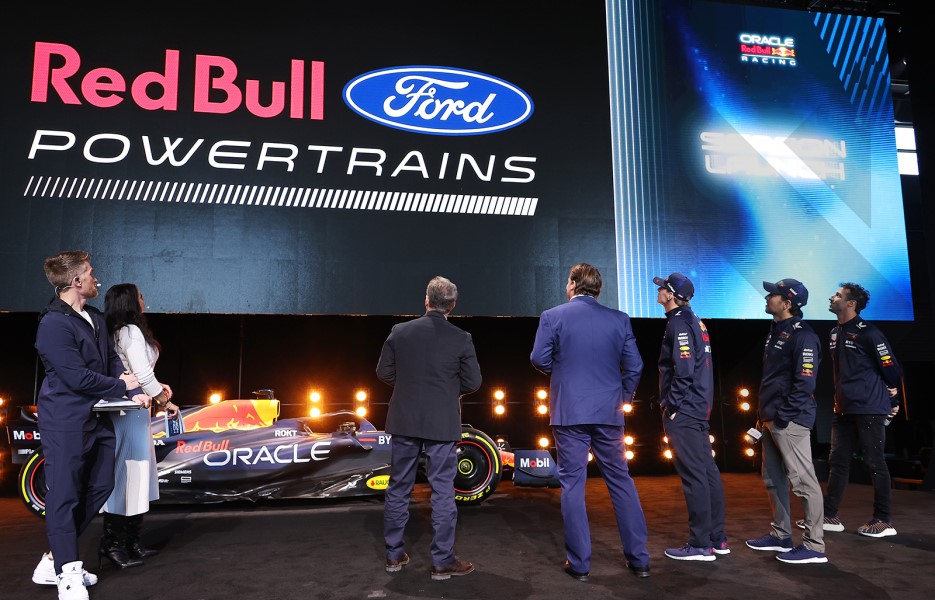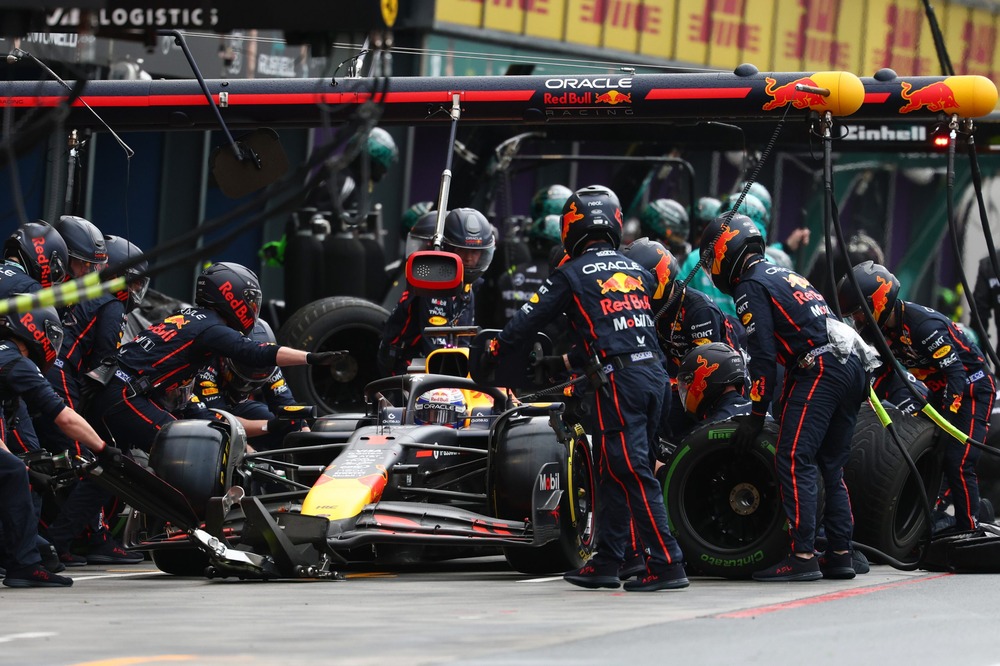The Red Bull Ford partnership will be instrumental in overcoming the challenges of new regulations as both work tirelessly on 2026 F1 power unit development.
As the sport prepares for transformative regulatory changes in 2026, this partnership combines Red Bull’s championship-winning pedigree with Ford’s storied legacy in motorsport and cutting-edge technological expertise.
Announced in early 2023, the Red Bull Ford partnership has already made huge strides with both entities working tirelessly to develop a next-generation power unit that aligns with Formula 1’s sustainability-focused future.
Ford’s Return to Formula 1
Ford’s re-entry into Formula 1 marks the end of a two-decade hiatus since its departure in 2004, following Jaguar’s exit from the sport. This return is not merely symbolic; it represents a strategic move to showcase Ford’s technological innovations on a global stage.
During Ford Performance presentation for 2025, Executive Chairman of Ford Motor Company Bill Ford described the partnership as “a thrilling new chapter” in the company’s motorsport history which dates back to Henry Ford’s first race win that helped launch the automaker over a century ago.
“Formula 1 is our chance to showcase Ford technologies on a global stage to a whole new audience, generating excitement for the iconic Ford brand all around the world,” he said. “This is such an exciting chapter in Ford’s history.
“Over the past 20 years Red Bull has succeeded in changing the landscape of Formula 1 and it has done so by being determined to do things differently, an ethos that is very much emulated in the Red Bull Ford partnership and with the title sponsorship of the Red Bull Ford Academy Programme.”
Ford’s decision to partner with Red Bull Powertrains underscores its commitment to sustainable innovation which aligns with Formula 1’s broader goal of achieving carbon neutrality by 2030..
The Red Bull Ford partnership will focus on developing a hybrid power unit featuring a turbocharged internal combustion engine capable of running on 100% sustainable fuels, alongside a powerful 350 kW electric motor.
Why Red Bull Chose Ford
Red Bull Racing’s decision to partner with Ford was influenced by several factors, including the automaker’s expertise in battery technology, electric motor systems, and analytics which would provide invaluable support as they develop their first in-house power unit.
The partnership also represents a divergence from Red Bull’s previous relationship with Honda which will conclude at the end of the 2025 F1 season.
While Honda played a pivotal role in Red Bull’s recent successes—including multiple Drivers’ and Constructors’ Championships—Ford’s approach offers greater alignment with Red Bull’s long-term vision.
Unlike previous negotiations with Porsche which sought greater control over team operations, Ford has adopted a more collaborative stance, allowing Red Bull to maintain its independence while benefiting from Ford’s technical contributions.
Additionally, in 2024 the American automaker confirmed extension of title partnership for Red Bull Ford Academy Programme for the 2025 season. The continued alliance further demonstrates Ford’s long supported commitment to attracting more diversity across its motorsport’s portfolio.
“It is a hugely exciting time for the Team and while the prospect of building our own engine is an undertaking that cannot be underestimated, the Red Bull Ford partnership is a pivotal one in the overall project,” Red Bull Team Principal and CEO Christian Horner said.
“Ford have a long and storied history, synonymous with success through 120 years of motor racing and development. Today’s launch is a reflection of that success and growth.
“Not only are Ford instrumental in our powertrain journey, they emulate our dedication to supporting female talent through their title sponsorship of the Red Bull Ford Academy Programme. It is, as I say, an exciting time.”
The Technical Vision for 2026 F1
The 2026 F1 power unit regulations present both challenges and opportunities for manufacturers. The new engines will feature increased electrical power output and fully sustainable fuels while maintaining safety and cost efficiency.
These changes are designed to make Formula 1 more environmentally friendly without compromising performance.
Ford’s technical contributions will extend across several critical areas including: Battery Cell and Electric Motor Technology – to optimize the hybrid system for maximum efficiency, Power Unit Control Software – to manage energy recovery systems and overall engine performance and Turbocharger Development.
This comprehensive approach ensures that Red Bull Powertrains will be well-equipped to meet the demands of the new regulations while maintaining their competitive edge.
Red Bull Powertrains: Building Independence
The Red Bull Ford partnership represents a critical step toward self-reliance. Historically, the team relied on external suppliers like Renault and Honda for its power units. However, the establishment of Red Bull Powertrains in Milton Keynes signaled a shift toward greater autonomy.
Developing their own engine is no small feat. Hundreds of engineers are currently working at the Red Bull Powertrains facility to integrate advanced technologies into the 2026 F1 power unit.
By collaborating with Ford, Red Bull gains access to specialized resources and expertise that would otherwise take years to develop independently.
Challenges Ahead
Despite their ambitious plans, Red Bull and Ford face stiff competition from established manufacturers like Mercedes-AMG High Performance Powertrains and Ferrari who have decades of experience developing high-performance engines under stringent regulations.
Moreover, transitioning from Honda’s proven power units to an entirely new system introduces risks related to reliability and performance. Horner acknowledged the scale of this undertaking but expressed confidence in his team’s ability to rise to the challenge.
“We’re under no illusions that we’ve got great mountains to climb,” he added. “We’ve got 48 weeks of flat-out development and durability testing to get the engine into as competitive a position as we can to start racing in 2026.
“What we don’t know is what our competitors are doing. But this time next year, cars with Red Bull Ford powertrains are going to be pulling into the pit lanes in Barcelona for the first time, which is going to be a monumental moment.”
The first tests of the 2026 F1 power unit will be critical milestones in determining whether the Red Bull Ford partnership can deliver on its promise.
The Road Ahead
As preparations intensify for the 2026 F1 season, there is optimism about what lies ahead for the Red Bull Ford partnership. With work already underway at their Milton Keynes facility, fans can expect exciting developments as this collaboration progresses.
Whether it leads to dominance on track remains to be seen, but one thing is certain: Red Bull and Ford are committed to shaping the future of Formula 1.





